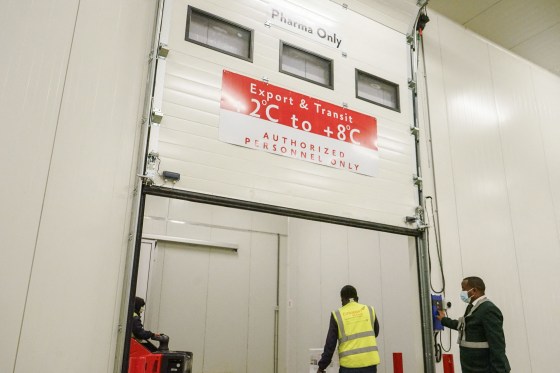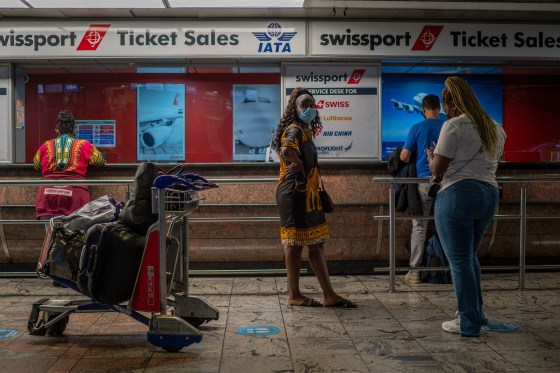[ad_1]
The emergence of the Omicron COVID-19 variantFirst found in South Africa and different South African nations, it sheds new gentle on vaccine inequality. Well being specialists have been warning for months that low vaccination charges in growing nations enhance the chance that harmful new mutations will kind if the SARS-CoV-2 virus spreads unchecked.
Up to now, solely 7.3% of Africans are absolutely vaccinated in opposition to COVID-19, in comparison with 58% in each the US and Europe, the place booster vaccinations at the moment are broadly obtainable. Within the meantime solely 12% of the 1.9 billion cans promised to low and center revenue nations had been delivered in early November.
[time-brightcove not-tgx=”true”]
However it’ll take greater than only a flood of COVID-19 vaccine doses to enhance Africa’s vaccination fee. Lack of coordination in vaccine deliveries, weak well being infrastructure, and vaccination hesitation sown by distrust and misinformation decelerate vaccination efforts when doses can be found, African well being specialists say.
Even South Africa, which has one of many highest vaccination charges on the continent with 24% of the absolutely vaccinated inhabitants, is struggling to get extra firearms. As South African scientists rocked the world final week with their identification of the brand new variant of Omicron, well being officers within the nation urged US drug makers to delay supply of additional doses of the vaccine as a result of the demand shouldn’t be sturdy sufficient and they’re involved about impending expiration dates.
Scientists don’t but know whether or not the Omicron variant is extra harmful. Nonetheless, they’re involved that the massive variety of mutations, together with about 30 in spike protein, might make it extra transmissible and make vaccines much less efficient.
“What was occurring was largely inevitable. The present variant, Omicron, is the results of the world’s failure to vaccinate its residents pretty and effectively, ”says Dr. Ayoade Alakija, Co-Chair of the African Union’s African Vaccine Supply Alliance. “The reckless and isolationist conduct of the International North created the present scenario, and till they’re held accountable, I worry Omicron could be the start.”

Dangerous coordination of vaccine deliveries
A lot of the African nations trusts in COVAX, a program to ship vaccines to low and center revenue nations to offer provides of COVID-19 vaccines. Nonetheless, when the world’s largest vaccine maker, Serum Institute of India, was hit by manufacturing issues and an export ban following India’s COVID-19 surge, vaccine shipments slowed to a trickle. Solely 245 million doses have been shipped to sub-Saharan Africa, in keeping with UNICEF’s vaccine tracker.
Proceed studying: India has not purchased sufficient vaccines. Now the world pays
Many African nations are depending on donations. However transports are sometimes “poorly coordinated,” says Dr. Lul Riek, Southern Africa Coordinator of the African Facilities for Illness Management and Prevention. Worse nonetheless, some shipments include cans which can be near their expiration date.
“[The vaccines] will arrive within the nation, perhaps not even on the proper time, not when they’re anticipated. And so they even have a really quick shelf life – they expire in three or two months, ”Riek instructed TIME.
In Namibia, for instance, authorities will destroy round 50,000 doses of the AstraZeneca vaccine as a result of they expire subsequent week. Though solely 11% of the Namibian inhabitants is absolutely vaccinated, well being officers warn that declining demand might drive them to destroy an extra 200,000 doses of Pfizer BioNTech vaccine in January and February, partly as a result of hesitant vaccination and an earlier time Dose exhaustion.
The necessity to retailer vaccines in extraordinarily chilly temperatures additional complicates vaccination efforts in sub-Saharan Africa. Many nations had underfunded and overburdened well being programs earlier than the pandemic.
“There are issues about medical infrastructure and particularly chilly chain storage,” says Alakija. “Nonetheless, the appreciable further stress brought on by the quick shelf lifetime of the vaccines is pointless and unfair.”

Distrust stirs up vaccination hesitation
Even with sufficient vaccine doses obtainable, vaccination hesitation is excessive throughout the continent – fueled by a mix of on-line misinformation, mistrust of presidency leaders and others Historical past of Western Medical Experiments On the continent.
A December 2020 Africa CDC survey discovered that 79% of respondents stated they had been taking a COVID-19 vaccine when it was protected and efficient, however 25% of 15,000 respondents stated they imagine a COVID-19 vaccine shouldn’t be protected.
The hesitant vaccination of well being employees is one other drawback. Whereas at the least 80% of their healthcare employees in high-income nations are vaccinated, solely 27% of healthcare employees in Africa say they’ve been absolutely vaccinated a report from the World Well being Group November revealed. Surveys in some nations recommended that lower than half of well being employees are able to get the COVID-19 shot.
In South Africa, the Younger Nurse Indaba Commerce Union has urged its 18,000 members to boycott the vaccine. Union chief Wealthy Sicina tells TIME that his group shouldn’t be in opposition to the vaccine, however says the federal government didn’t seek the advice of well being employees in regards to the vaccine launch and the group distrusts the method.
Sicina additionally expressed concern about how shortly the COVID-19 vaccines had been being developed and launched – although drug producers have performed massive medical trials previous to regulatory approval and that an estimated 3.Three billion individuals around the globe are receiving doses with few negative effects have reactions.
Journey bans might make it worse
Whereas many specialists imagine that COVID-19 have to be stopped for good, it have to be defeated in Africa and the growing world, African authorities say the latest journey bans as a result of Omicron variant will solely have an effect on their potential to battle the virus.
Thierno Balde, Incident Supervisor for COVID-19 Emergency Response on the WHO Africa Regional Workplace, instructed TIME that restrictions would solely stigmatize nations that may shortly report infections as sizzling spots.
“If individuals are not inspired to share the data in a well timed method, these variants will simply proceed to flow into in lots of different nations,” he says.
One consequence of those bans, says Russell Rensburg, director of the Rural Well being Advocacy Mission on the College of Witwatersrand in Johannesburg, is that laboratories in affected nations can have issue getting reagents for performing COVID-19 checks on account of fewer inbound flights get hold of. Which means fewer alternatives to trace the distribution of the Omicron variant – even in South Africa, which has superior genome sequencing amenities that found Omicron and different variants.
The ban on flights to and from the area might hit developed nations once more – as might the gradual switch of COVID-19 vaccine doses to the continent.
“I believe these are a few of the issues that aren’t taken into consideration when these political leaders implement journey bans,” says Rensburg. “I believe it is one thing the world has to take a look at. How will we take care of this international drawback that wants international options? We should always reasonably work collectively than in opposition to one another. “
[ad_2]







































Discussion about this post